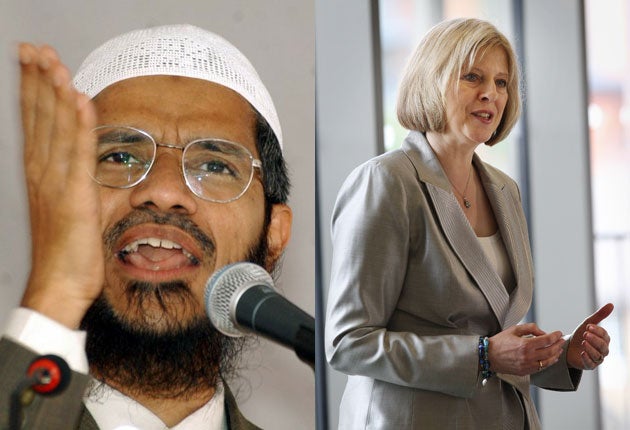Courted by MI6, banned by the Government
I was asked by security services to educate Muslims – then barred from UK, says preacher

Your support helps us to tell the story
From reproductive rights to climate change to Big Tech, The Independent is on the ground when the story is developing. Whether it's investigating the financials of Elon Musk's pro-Trump PAC or producing our latest documentary, 'The A Word', which shines a light on the American women fighting for reproductive rights, we know how important it is to parse out the facts from the messaging.
At such a critical moment in US history, we need reporters on the ground. Your donation allows us to keep sending journalists to speak to both sides of the story.
The Independent is trusted by Americans across the entire political spectrum. And unlike many other quality news outlets, we choose not to lock Americans out of our reporting and analysis with paywalls. We believe quality journalism should be available to everyone, paid for by those who can afford it.
Your support makes all the difference.A controversial Islamic preacher who was banned from entering the country by the Home Secretary Theresa May has claimed that he was twice approached by security officials who wanted him to help educate disaffected young British Muslims.
The Mumbai-based evangelist and scholar Dr Zakir Naik – who was barred from entering the UK in June, a few days before he was due to give talks to thousands of Muslims in London, Birmingham and Sheffield – said that before the general election he was twice approached by British security officials to help reform those in danger of becoming extremists.
But, following the change of government, Ms May banned him from entering the country, highlighting contentious quotes he had given as justification. Dr Naik is to challenge her decision in the High Court this month, claiming that his comments have been taken out of context. Dr Naik said: "In 2009, I was sounded out by government officials representing the Home Office and the anti-terrorism department to see if I would co-operate with them to reach out to misguided young Muslims.
"They said I would make an ideal envoy. I told them I would be happy to co-operate. Now after the change of government, the attitude has changed. Only last year the Government wanted me to help tackle terrorism; this year they are calling me a terrorist."
At the time, says Dr Naik, he discussed how he could use his television channel, Peace TV, to help spread his message to disaffected Muslims and invited the officials to one of his talks.
The subject was broached again this year, when Dr Naik's UK office held a meeting with Home Office security officials. Legal documents lodged at the High Court state that on 3 June, Dr Naik's representatives met Charles Farr, director general of the Office for Security and Counter-terrorism (OSCT), along with Sabin Khan, a community adviser, and Debbie Gupta, also of the OSCT. The documents state that at the meeting Mr Farr said he was in favour of Dr Naik coming to the UK.
Ms Gupta, who is a facilitator for the Government's Prevent programme – which aims to stop people from becoming terrorists by reaching out to Muslim communities – is quoted as saying: "Dr Naik can reach the people we simply cannot."
The documents also allege that, in subsequent telephone calls, Ms Khan reiterated that she and Mr Farr felt Dr Naik's visit to the UK could be "very constructive and positive". She has since reportedly been suspended from her position after allegedly criticising Ms May's decision.
Dr Naik has hired two lawyers to fight his case. Defeat for Ms May would be embarrassing, as the order was her first test in office relating to government policy on perceived extremists. In her letter highlighting the reasons for his exclusion, Ms May quoted Dr Naik's assertion that "all Muslims should be terrorists" as one example of his "unreasonable behaviour". He claims the statement was taken out of context. "I said every Muslim should be a terrorist to each and every anti-social element in society... but no Muslim should ever terrorise a single innocent human being," he insisted.
Another passage quoted in the court document is said to come from a 2006 lecture, in which Dr Naik said of Osama bin Laden: "If he is fighting the enemies of Islam, I am for him." Dr Naik claims the date of this comment is incorrect and that the lecture was given in 1998, before the 11 September attacks.
A spokesperson for the Home Office said: "It would be inappropriate to comment on an ongoing court case. The Home Secretary will consider many views in making a decision but will exclude an individual if she considers that their presence in the UK is not conducive to the public good. We will defend this position robustly."
Dr Zakir Naik
* Ranked the 82nd most powerful person in India last year, Dr Zaik was born in Mumbai in 1965 and trained in medicine at university. He abandoned this career in 1991 to concentrate on preaching, founding the Islamic Research Foundation which uses the media and its own television channel – Peace TV – to promote understanding of Islam. While he is recognised as an authority on Islam, he has also earned a reputation for making disparaging remarks about other faiths, arguing that those "who change their religion should face the death penalty". He has also been filmed saying that "There are many Jews who are good to Muslims, but as a whole...The Koran tells us, as a whole, they will be our staunchest enemy."
Join our commenting forum
Join thought-provoking conversations, follow other Independent readers and see their replies
Comments